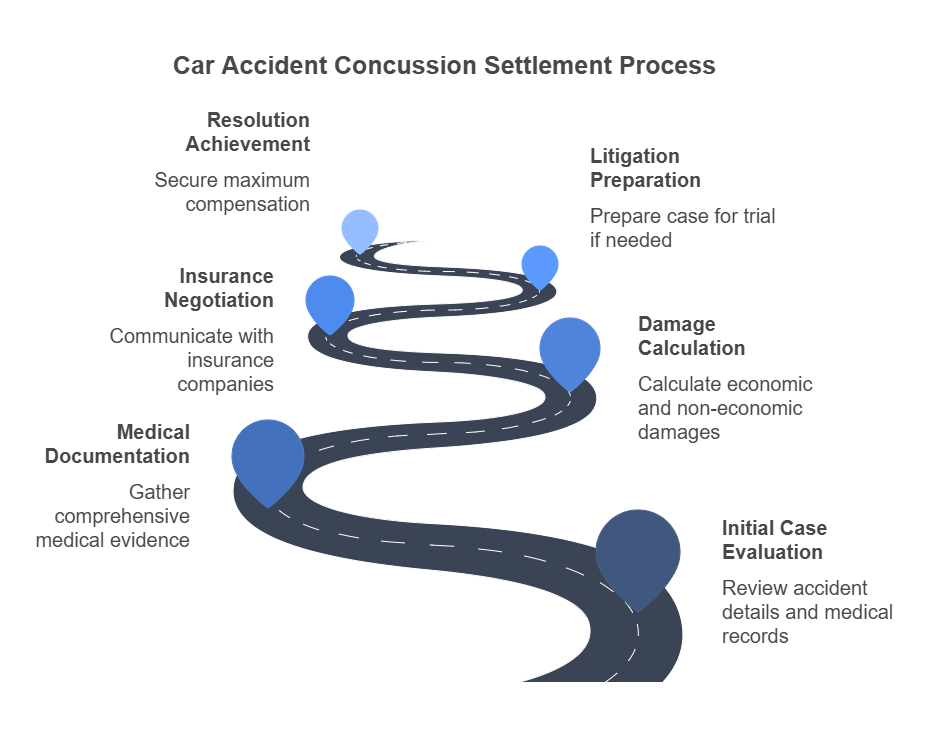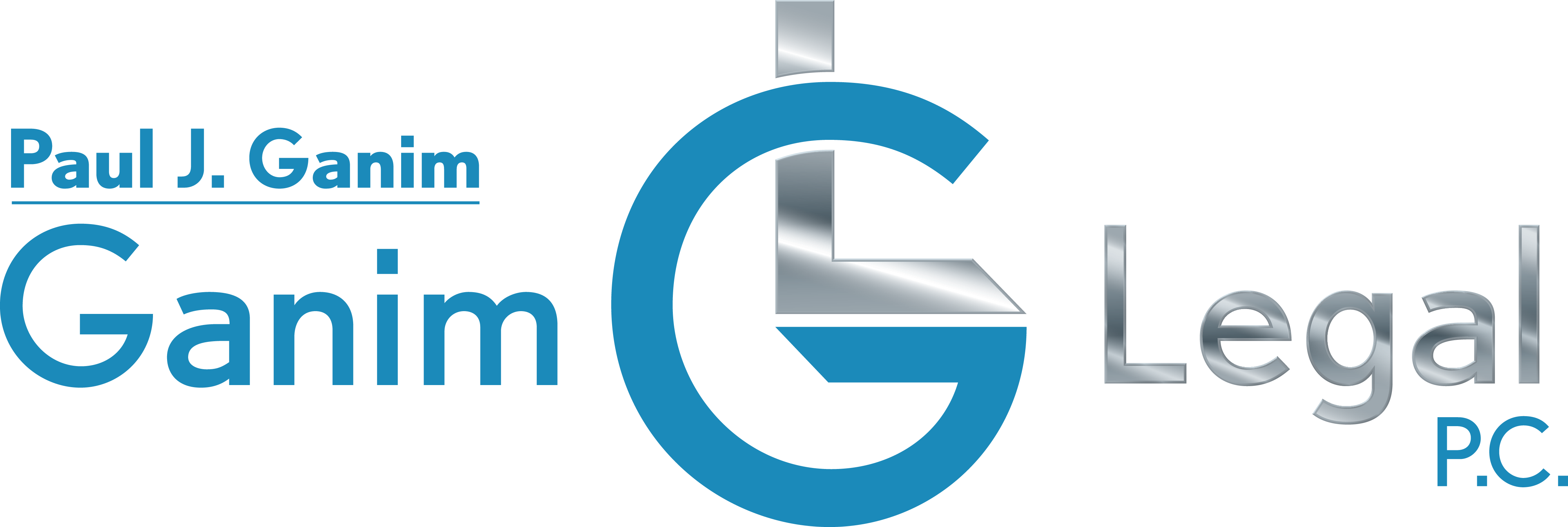In Connecticut, the average concussion car accident settlement amount ranges from $2,000 to $50,000, though this amount depends on several critical factors. The final settlement value varies significantly based on:
- Severity of the concussion and related brain injuries
- Duration and persistence of concussion symptoms
- Impact on daily life and cognitive function
- Medical expenses and treatment costs
- Loss of income and future earning capacity
- Quality of medical documentation and expert testimony
Need a Settlement for Concussion in a Car Accident?
To pursue compensation for your concussion injuries, you must meet specific requirements:
- You suffered injuries directly from the car accident
- Your claim falls within Connecticut’s two-year statute of limitations from the accident date
⚖️ Every concussion case presents unique circumstances that require personalized legal evaluation. At Ganim Legal, P.C., we truly grasp the significance of the issues our clients face and recognize that it goes beyond mere legal matters—it often encompasses your well-being, future, and the people dear to you.
Our Bridgeport car accident attorney is ready to fight for the compensation you deserve following your accident.
Our Concussion Settlement Amounts
Our firm has secured substantial personal injury settlements for clients injured in motor vehicle accidents throughout Connecticut:
- $1,500,000 – A 28-year-old woman was struck while crossing Main Street in Bridgeport. The defendant failed to yield, ran over her feet, and threw her over the hood. She developed regional sympathetic dystrophy. The jury deliberated for 90 minutes before returning the verdict.
- $283,544 plus interest – A 40-year-old man was rear-ended while stopped at a red light on East Main Street in Stamford. He suffered serious neck and back injuries. The jury returned a verdict after three hours of deliberation.
- $295,000 – A 39-year-old man was awarded this amount in a special arbitration against the City of Bridgeport after being thrown around inside a bus during a collision. He underwent three abdominal surgeries and sustained permanent back and spinal damage, forcing him to abandon his technical school program and career plans.
These personal injury settlement amounts examples show how we approach each case, intending to secure the highest possible compensation based on your injuries and long-term impact.
💡 Our car accident settlement calculator provides an initial estimate based on your specific circumstances and injury details.
Disclaimer: The results generated by this car accident settlement calculator are for informational and illustrative purposes only. They do not constitute legal advice or a substitute for professional evaluation.
Selected Value: 0%
Let our Trumbull car accident lawyer provide tailored guidance during your free consultation to maximize your potential compensation.
Factors Influencing the Average Settlement for a Concussion in a Car Accident
Multiple variables determine your final settlement amount when you’ve been diagnosed with a concussion following an auto accident. The Connecticut Judicial Branch offers public resources that help explain how factors like fault, damages, and comparative negligence impact personal injury claims
Severity of the Concussion and Related Brain Injuries
The severity of your concussion directly correlates with settlement value, as more severe injuries typically result in higher settlement amounts. Diagnostic tests like CT scans or MRIs help establish the extent of brain trauma and support your claim for damages.
Severe concussions involving loss of consciousness, persistent cognitive dysfunction, or permanent brain damage command significantly higher settlement amounts than mild traumatic brain injury cases. Insurance companies rely heavily on medical evidence to determine the severity of the injury and appropriate compensation levels.
Duration and Persistence of Concussion Symptoms
⚠️ Concussion symptoms can be difficult to identify initially and may take even days or weeks to appear following the accident. The longer symptoms persist, the higher your potential settlement, as prolonged recovery indicates more significant injury impact.
When symptoms extend beyond typical recovery timeframes, this suggests more serious underlying brain trauma requiring extended treatment and higher compensation.
Impact on Daily Life and Cognitive Function
Concussion injuries that significantly disrupt your ability to work, maintain relationships, or perform daily activities justify higher average settlement amounts. Detailed medical documentation from healthcare providers helps establish how the injury affects your quality of life.
The movement of the head during sudden and forceful impacts can cause the brain to bounce around inside the skull, potentially leading to lasting cognitive impairments. When these changes affect your ability to concentrate, remember information, or maintain employment, settlements must account for these life-altering consequences.
Medical Expenses and Treatment Costs
💡 Immediate medical attention following a car accident is essential for proper concussion diagnosis and treatment. All medical expenses, from emergency room visits to ongoing neurological care, factor into your settlement calculation.
Comprehensive treatment for concussion injuries often includes diagnostic imaging, neurological evaluations, physical therapy, and specialized rehabilitation services. Insurance companies must cover reasonable and necessary medical expenses related to your injury, including future treatment needs for ongoing symptoms.
Loss of Income and Future Earning Capacity
When concussion symptoms prevent you from returning to work or reduce your earning capacity, these economic losses significantly increase your settlement value. Documentation from employers and medical professionals helps establish the connection between your injury and lost wages.
Long-term consequences of severe concussions may permanently affect your ability to perform certain job functions, justifying compensation for reduced future earnings. This calculation requires expert testimony from vocational experts and economists to project lifetime income losses.
Quality of Medical Documentation and Expert Testimony
Thorough medical records and expert testimony from neurologists or neuropsychologists strengthen your case and support higher settlement amounts. Definitive medical evidence linking your symptoms to the accident is essential for maximizing compensation.
The type of headache, frequency of dizziness episodes, and specific cognitive deficits must be documented by healthcare providers. Expert medical testimony helps explain complex neurological concepts to insurance adjusters and demonstrates the serious nature of your injuries.

Connecticut Car Accident Laws Affecting Concussion Settlement Amounts
Connecticut’s legal framework significantly influences how concussion settlements are calculated and pursued following auto accidents.
- Comparative Negligence: Connecticut follows a modified comparative negligence rule, meaning your settlement may be reduced if you’re found partially at-fault for the accident, but you can still recover damages if you’re less than 51% responsible
- Statute of Limitations: You have two years from the accident date to file a personal injury lawsuit for your concussion injuries, making prompt legal action essential for preserving your rights
- Mandatory Insurance Coverage: Connecticut requires minimum liability coverage of $25,000 per person and $50,000 per accident, though uninsured/underinsured motorist coverage provides additional protection when at-fault drivers lack adequate insurance
- No-Fault Benefits: Connecticut operates under a fault-based system, meaning the at-fault driver’s insurance company is responsible for covering your damages, including medical expenses and lost wages
Resources like the University of Connecticut provide educational materials on legal concepts, while Yale New Haven Hospital offers comprehensive medical care for traumatic brain injuries.
The Process for a Car Accident Concussion Settlement
⚖️ Our systematic approach ensures a comprehensive evaluation of your concussion case and maximizes your potential settlement value:
- Initial Case Evaluation: We conduct a thorough review of your accident, medical records, and symptoms to assess the strength of your claim and potential settlement range
- Medical Documentation: Our team works with your healthcare providers to gather comprehensive medical evidence, including diagnostic test results and expert opinions on your prognosis
- Damage Calculation: We meticulously calculate all economic and non-economic damages, including medical expenses, lost wages, pain and suffering, and future treatment needs
- Insurance Negotiation: We handle all communications with insurance companies, presenting compelling evidence to support your settlement demand and negotiating aggressively on your behalf
- Litigation Preparation: If settlement negotiations fail to produce fair compensation, we prepare your case for trial, including depositions, expert witness preparation, and comprehensive case development
- Resolution Achievement: Whether through negotiation or trial verdict, we work tirelessly to secure the maximum compensation available for your concussion injuries

Challenges in Pursuing a Post-Concussion Syndrome Car Accident Settlement
Several obstacles can complicate concussion settlement cases, requiring our experienced legal representation to overcome these hurdles effectively.
Delayed Symptom Onset and Diagnosis Difficulties
✅ Concussion symptoms may not appear immediately following the accident, creating challenges in establishing a direct connection between the crash and your injuries. Insurance companies often exploit this delay to argue that symptoms resulted from other causes unrelated to the accident.
The brain’s complex nature makes concussion diagnosis challenging, as symptoms can be subtle initially and worsen over time. Standard imaging tests may not reveal microscopic brain damage, requiring specialized neuropsychological testing to document cognitive impairments and memory problems.
Healthcare providers must carefully document the timeline of symptom development and use standardized concussion assessment tools to establish baseline function. This detailed documentation becomes vital evidence when insurance companies question the legitimacy or severity of your injuries, particularly in cases where the plaintiff allegedly suffered seemingly minor trauma.
Insurance Company Tactics and Settlement Minimization
Insurance companies frequently employ tactics designed to minimize concussion settlements, often claiming that symptoms are exaggerated or unrelated to the accident. They may rush settlement offers before the full extent of your injuries becomes apparent, hoping to avoid paying for long-term treatment costs.
Adjusters often challenge the need for ongoing medical treatment or question whether reported symptoms truly impact your daily life. They may request independent medical examinations with doctors known for providing opinions favorable to insurance companies rather than injured plaintiffs.
⚠️ Early settlement offers rarely reflect the true value of concussion injuries, particularly when long-term consequences remain unknown. Accepting initial offers can prevent you from seeking additional compensation if symptoms worsen or new complications develop over time.
Proving Non-Economic Damages and Pain Suffering
Demonstrating pain and suffering from concussion injuries presents unique challenges, as these symptoms are largely subjective and invisible to outside observers. Unlike broken bones or visible wounds, cognitive symptoms and emotional distress require careful documentation through medical records and personal testimony.
Establishing the impact of persistent headaches, memory problems, and personality changes on your quality of life requires comprehensive evidence gathering. Family members, employers, and friends may need to testify about observed changes in your behavior and abilities following the accident.
The subjective nature of concussion symptoms makes it difficult for juries to understand the significant impact these injuries have on victims’ lives. Expert testimony from neurologists and neuropsychologists helps explain the complex relationship between brain trauma and reported symptoms, lending credibility to your pain and suffering claims.
The Vital Role of Medical Evidence in a Concussion Lawsuit Settlement
Strong medical evidence forms the foundation of successful concussion settlements, providing objective proof of your injuries and their impact on your life.
- Diagnostic Tests and Evaluations: Comprehensive neurological testing, including CT scans, MRIs, and neuropsychological assessments, helps document the extent of brain trauma and cognitive dysfunction. These objective findings counter insurance company arguments that minimize your injuries.
- Expert Medical Testimony: Qualified neurologists and neuropsychologists provide professional opinions linking your symptoms to the accident and explaining the long-term implications of your injuries. Their testimony helps establish causation and justifies higher settlement amounts.
- Detailed Treatment Records: Complete documentation of all medical appointments, treatments, and therapy sessions demonstrates the ongoing nature of your injuries and the necessity of continued care. This evidence supports claims for future medical expenses and long-term treatment needs.
- Functional Capacity Evaluations: Specialized testing that measures your ability to perform work-related tasks and daily activities provides objective evidence of how concussion symptoms affect your functional abilities and earning capacity.
Consistent medical treatment and compliance with prescribed therapies strengthen your case by showing that you’re actively working toward recovery while documenting persistent symptoms. Our legal team knows which medical experts to involve and what evidence is needed to present a compelling claim that accurately reflects the seriousness of your condition.
Hypothetical Scenarios and Real Case Examples
💡 Hypothetical Scenario 1: A 42-year-old office manager was rear-ended during evening traffic in Stamford. She experienced mild headaches and fatigue but assumed it would pass. When the insurance company offered her $6,000 within days of the crash, she accepted without speaking to an attorney.
Months later, her symptoms worsened, leading to a formal diagnosis of post-concussion syndrome, months of missed work, and over $20,000 in medical expenses. Since she had already accepted the settlement, she had no further legal recourse.
💡 Hypothetical Scenario 2: A delivery driver suffered a concussion in a rear-end collision on Route 8. He hired a general practice lawyer with little personal injury experience. The attorney failed to gather neuropsychological evidence or consult specialists, resulting in an undervalued claim.
The insurance company offered $40,000, citing a lack of documentation. A more experienced injury attorney later reviewed the case and believed it could have been worth over $150,000 with proper expert support and medical proof.
These scenarios show how accepting a quick settlement or working with the wrong legal representation can lead to significantly undervalued claims. Even when concussion symptoms seem minor at first, their long-term effects can severely impact daily life and earning capacity.
How Our Experienced Connecticut Personal Injury Lawyers Can Help
At Ganim Legal, P.C., we understand the complex nature of concussion injuries and the challenges they present in settlement negotiations. Our dedicated team has extensive experience handling car accident cases involving brain injuries, securing substantial compensation for clients throughout Connecticut.
With attorney Paul Ganim leading the way, our law firm is dedicated to providing effective legal solutions while emphasizing friendly and supportive services. We aim to assist you through the challenges of these difficult life events and help you weather the storm.
We provide comprehensive legal representation that includes thorough case investigation, expert medical witness coordination, and aggressive negotiation with insurance companies. Our proven track record of successful settlements and trial verdict outcomes demonstrates our commitment to achieving optimal results for every client.
Contact us via our form for a free consultation to discuss your concussion injury case and learn how we can help you secure the compensation you deserve — or call (203) 884 7075 to speak with our team directly.

FAQs
How long do I have to file a concussion lawsuit in Connecticut?
Connecticut’s statute of limitations gives you two years from the accident date to file a personal injury lawsuit for concussion injuries. This deadline is strictly enforced, so consulting with our attorney promptly after your accident ensures you preserve your legal rights and don’t miss important deadlines that could bar your claim entirely.
Can I still recover compensation if I was partially at fault for the accident?
Yes, Connecticut’s comparative negligence law allows you to recover damages even if you share some responsibility for the accident, provided you’re less than 51% at fault. Your settlement will be reduced by your percentage of fault, but you can still pursue compensation for your concussion injuries and related damage.
What if my concussion symptoms worsen after accepting a settlement?
Accepting a settlement typically requires signing a release that prevents you from seeking additional compensation later, even if symptoms worsen. This is why it’s essential to wait until you reach maximum medical improvement before settling, ensuring all potential complications and long-term effects are considered in your settlement amount.
How do I prove my concussion was caused by the car accident?
Proving causation requires prompt medical attention after the accident, detailed documentation of symptom onset and progression, and expert medical testimony linking your injuries to the crash. The sooner you seek treatment and begin documenting symptoms, the stronger the connection between your accident and resulting concussion becomes.
Will my settlement be affected if I had a previous concussion?
Previous concussions don’t automatically reduce your settlement, but they may complicate your case by making it harder to distinguish new symptoms from pre-existing conditions. Our attorney will work with medical experts to demonstrate how the recent accident aggravated or worsened your condition, ensuring you receive appropriate compensation for accident-related damages.





